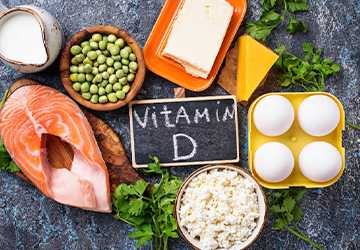Everyone wants to be as well as possible, but females, in particular, have unique dietary demands. Although a well-balanced diet is vital, some nutrients help improve and supplement a female's overall well-being. In this post, we will examine the top ten crucial nutrients for females' well-being, offering precise and thorough information to help you make decisions.
Omega-3 Fatty Acids
Heart well-being, brain function, and inflammation reduction need to consume omega-3 fatty acids. DHA benefits fetal brain development throughout pregnancy, especially for females in their reproductive years. Omega-3 nutrients from fish oil are common, although vegetarians can also significantly help from plant-based sources such as flaxseed or algal oil.

Calcium and Vitamin D
their bones significantly impact females' overall well-being, and calcium and vitamin D play a significant part in this. Bone density depends on calcium, and vitamin D facilitates calcium absorption. Combined, they lessen the chance of osteoporosis and fractures, which is crucial for females as they age.
Iron
females are more likely to be iron deficient, especially during menstruation. Sufficient iron levels are vital for maintaining oxygen transport and preventing anaemia and weariness. To assist in achieving these demands, lean meats, legumes, and fortified cereals are good sources of iron, as are iron nutrients.
Bromate
Folate, often known as vitamin B9, is vital for females planning to have children because it helps fetuses develop without neural tube abnormalities. It facilitates DNA synthesis and repair as well. Good dietary sources include leafy greens, legumes, and fortified cereals; nutrients guarantee adequate intake, particularly during pregnancy.
Calcium
The body uses magnesium for over 300 metabolic processes, including the synthesis of energy and the operation of muscles. It can help females with PMS symptoms, support well-being bones, and control blood sugar. Nutrients containing magnesium or foods high in magnesium, such as leafy greens, almonds, and seeds, are advantageous additions.
B12 vitamin
Red blood cell production, DNA synthesis, and neuron function depend on vitamin B12. The risk of B12 insufficiency rises with age in females, which might affect energy levels and cognitive performance. To help satisfy daily requirements, B12 pills or foods fortified with B12, such as nutritional yeast or fortified cereals, can be consumed.

Aloe vera
For the immune system, skin, and vision to remain well-being, vitamin A is vital. It affects reproductive well-being as well. Nutrients can guarantee appropriate amounts of beta-carotene, the precursor of vitamin A, even though a well-balanced diet rich in colourful fruits and vegetables provides it. This is especially true for individuals with dietary restrictions.
K-complex
Bone well-being and blood clotting depend on vitamin K. Vitamin K nutrients may help females, especially postmenopausal women, maintain their bone density and lower their risk of fractures. Nutrients provide a handy substitute for natural sources such as green leafy vegetables like spinach and kale.
CoQ10, or coenzyme Q10
Potent antioxidant CoQ10 promotes heart well-being and the synthesis of cellular energy. CoQ10 levels in females may decrease with age, affecting their general vitality and degree of energy. Nutrients can be helpful to close this gap and support general and cardiovascular well-being.
Collagen
The balance of gut bacteria must be maintained for both immunological and digestive well-being. Probiotic pills can help keep this equilibrium, assisting females in managing their mood, urinary well-being, and digestive problems. Fermented foods, kefir, and yoghurt also support the well-being of gut flora.
Why Nutrients are Vital for Females' Well-being?
By supplying the vital nutrients that may be difficult to obtain from diet alone, nutrients play a critical role in maintaining the well-being of females. The following are strong arguments in favour of supplementation for females:
lNutrient Gaps in Diet: For various reasons, including hectic schedules, dietary restrictions, or personal preferences, many females need help to maintain a properly balanced diet. Females can quickly and successfully fill nutritional shortages by taking nutrients, guaranteeing they get the vital vitamins and minerals required for good well-being.
lParticular Nutritional Demands: During pregnancy, nursing, and menopause, among other life phases, females have particular nutritional demands. Nutrients designed with various life stages in mind might offer focused assistance, enhancing general well-being and attending to the specific needs of a female's body.
lPrevention of Deficiencies: Females frequently suffer from deficiencies in specific nutrients, such as iron, calcium, and vitamin D. Nutrients can lessen the chance of developing well-being problems like anaemia, osteoporosis, and weakened immune systems by preventing and treating these deficiencies.
lHormonal Balance: A female's general well-being may be impacted by changes in her hormone levels over her lifetime. Omega-3 fatty acids, magnesium, and vitamin B6 are nutrients that help maintain hormonal balance, which reduces menopausal and PMS symptoms and enhances emotional well-being.
lHeart Well-being: As females age, cardiovascular well-being becomes increasingly important to them. Vitamin K, Coenzyme Q10, and omega-3 fatty acids are a few nutrients that help improve heart well-being by promoting energy generation, lowering inflammation, and preserving appropriate blood coagulation.
lBone Well-being: Because females are more prone to osteoporosis, calcium and vitamin D nutrients are crucial. Together, these nutrients enhance bone density, which lowers the risk of fractures and increases skeletal strength—especially in females who have just gone through menopause.
lReproductive Well-being: Folate is vital for females planning to have children to prevent neural tube abnormalities in growing fetuses. Nutrients guarantee a sufficient intake and provide an additional safeguard during early gestation and pregnancy planning.
Conclusion
These ten must-have nutrients for females cover many well-being advantages and cater to different demands at different phases of life. Even while taking nutrients can improve general well-being, you should always speak with a doctor before starting a new supplement regimen, mainly if you are pregnant or already have well-being issues.





